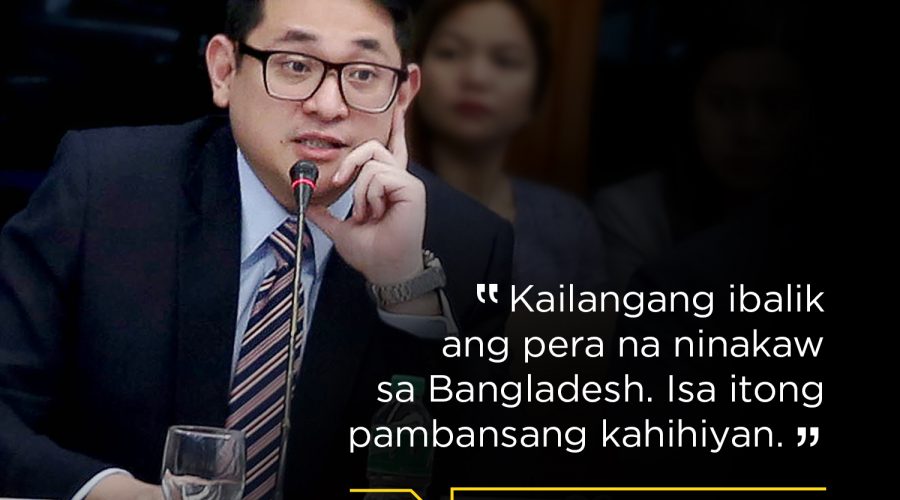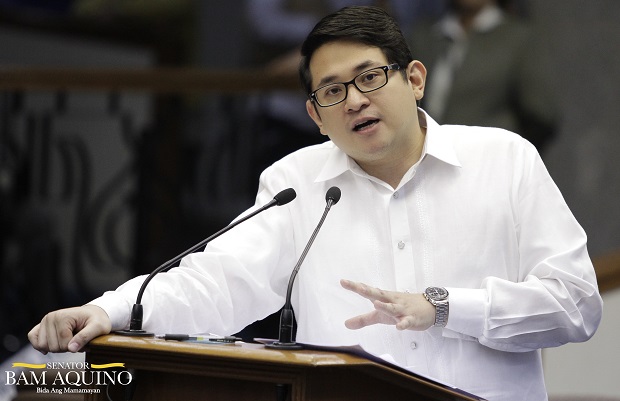Bam: Pambansang Kahihiyan ang Pagnanakaw sa Bangladesh
Transcript of Phone Patch Interview at News to Go
Q: Ano po ang inyong assessment o pananaw sa naging pagdinig sa senado kahapon?
Sen. Bam: Maraming mga real [inaudible] kasi nakadalo na rin si Kim Wong.
Noong unang mga hearing palagi mine-mention si Kim Wong at parang sa kanya naka focus ang spotlight noong wala siya, pero noong pumunta na siya kahapon, parang lumabas kaagad na mayroon talagang specific amount of money na hindi pa talaga na-a-account.
May P59 million na nasa casino and I’m happy to say that the casino wanted to return it. Kim Wong also said pwede niya rin ibalik and definitely priority dapat natin na maibalik ang pera.
Kahapon na napansin ko, iyong testimony ni Phill Leng is that $18 Million and P600 Million ang kanilang binigay kay Kim Wong at kay Wang King Tzu.
Sabi naman ni Kim Wong ang nakuha lang nila ay $5 Million at P400 Million. Kumbaga may balanse na $13 Million at P200 Million.
Napakalaking halaga niyan. Dalawang panig nag a-agree kung saan napunta ang pera na iyan. sa totoo lang it’s either Kim Wong o Philrem at iyon ay isang malaking bagay na na-reveal kahapon.
Iyong isa pa siguro is yung pera na nasa casino kaya naman nila i-trace. Kung tutuusin may kakayahan na kunin ulit ang pera na iyon through other legal preceding kasi galing ang pera na iyon sa nakaw at sinangayunan naman tayo ng AMLC na may kakayahan at kapangyarihan sila na kunin ulit ang pera na iyon.
Sa totoo lang 3rd hearing na natin ito at ngayon lang natin pinaguusapan kung paano pwede ibalik ang pera sa Bangladesh.
Q: Ano naman ang consequences kung hindi nga maibalik ang perang ito?
Sen. Bam: Nakaw kasi ang perang ito. I don’t think there are legal consequences in our country pero para sa akin isang pambansang kahihiyan ito na nasangkot ang mga kababayan natin sa ganitong klaseng nakawan.
We know na Bangladesh ay parang Pilipinas din yan na isang bansa na nagsisikap umangat rin. Ang perang yan ay halos P4 Billion din kasi. Bilyon bilyon din sa pera ng Bangladesh iyan at kailangan nila ang perang yan.
Sabi ko nga kung ginawa ito sa Pilipinas, ganun din ang magiging galit natin sa bansang iyon. I think it’s imperative, it’s a priority na kung ano ang pwede natin ibalik sa kanila ay ibalik na kaagad at pagplanuhan na kung paano pwede ibalik ang perang yan kung ang pera ng Bangladesh ay andito pa sa Pilipinas kasi definitely napakalaking na en-cash at andito pa yan sa ating bansa.
Ang casino operator, ang Eastern Hawaii na pag-aari ni Kim Wong, parang nandito pa rin ang perang iyan.
Iyong sa Solaire nalipat na nila sa isang foreign operator na pinatawag namin sa susunod na hearing. Malalaman natin kung nandito pa ang perang iyan.
It is important na i-prioritize natin na kahit malaking porsyento o sana lahat as soon as possible ay maibalik sa Bangladesh.
Q: Correct me if I’m wrong pero ang pagkakaintindi ko, ang mga pera na hindi pa nagagastos ay kaya pa isauli, pero ang pera na naisugal na ay mahirap na i-recover?
SBA: Ang mahirap i-recover that something I think na kailangan natin tingnan pa kasi siyempre ang mga casino sasabihin nila “natalo na yan, tapos nay yan”. Pero we cannot forget na if it’s proven, tainted fund yan.
That’s why I’m asking Executive Abad yesterday kung may kapangyarihan ba sila na kunin ito. Hindi din ganoon kaklaro ang sagot. Sabi naman niya meron but kung ano ang legal remedy ang pwedeng gamitin. But even if it’s in the casino, pwede pa itong makuha. Titignan natin sa susunod na hearing.
Q: Since the story broke, Senator, ang spotlight napunta nga sa casino na may nagsasabi na it’s kind of a black hole for being laundered or stolen from places around the world. So kasi exempted daw ang mga casino sa AMLC, hindi sila kailangan mag report sa mga awtoridad tungkol sa mga perang malalaking halaga na pumapasok sa kanilang sistema.
Sen. Bam: Sa totoo lang, isa sigurong kadudulutan nito is really amendment sa ating AMLA law. Iyong mga exempted, siguro iyong paghigpit sa mga loyal customer, ang pagiging clear rin sa kung ano ang pagtaas ng mga chain of command ng mga bangko saka kailangan maklaro rin iyon ng BSP.
Coming from this experience, mukhang marami din talagang kailangang reporma pang kailangang gawin pagdating ng 17th congress at una diyan ang paninigurado na hindi na gagamit ang ating legal institutions dito sa ating bansa para sa masasamang bagay.
Q: Ok. Nagkaroon din ng focus sa mga Remittance Center o mga kumpanya katulad ng Philrem. Hindi rin sakop ng anti-money laundering act o AMLA, isa rin ba iyan sa kino-consider ngayon na pumasok din iyan sa ilalim ng AMLA?
Sen. Bam: Isa rin iyan sa mga pinag-uusapan. Isa pa ang pagklaro sa bank secrecy law. I think natapos ang aming hearing kagabi sa isang debate kung pwede bang buksan ang suspicious account. Of course may magkakabilang panig iyan. Inaaral iyan ng mga Senate lawyers natin.
Pero para sa akin, kung klaro naman na hindi legal ang mga ginamit na identification sa pagbukas ng account and may problema na mismo ang account to begin with kasi sa mga IDs na ginamit ng 4 suspicious persons ay wala naman talagang ganun na government ID and they used the Driver’s License.
Kung mapatunayan naman kung fictitious ang ginamit na pagbukas ng account ay baka naman hindi na ito sakop ng Bank Secrecy Law.
Our Senate lawyers especially the Blue Ribbon Committee are studying kung puwede pa ito pagbuksan.
But then again sabi nga ng AMLC, naibigay na rin nila ang datos na ito sa Committee.


Recent Comments